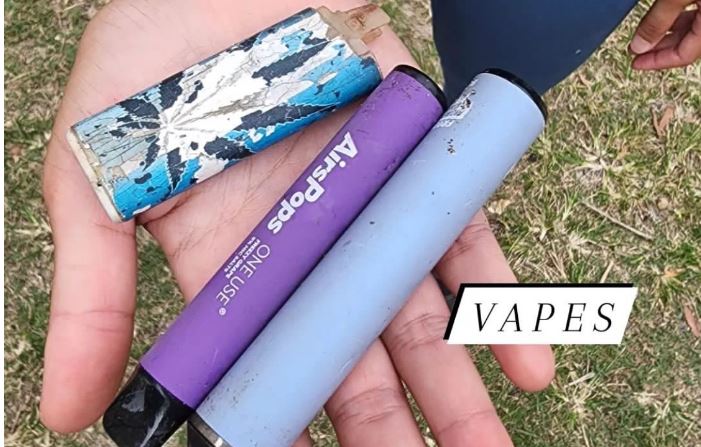Issues behind the smoke screen
Saturday 12 November 2022 | Written by Te Ipukarea Society | Published in Environment, National

Vape waste collected during the most recent beach cleanup and waste audit with Apii Nikao. TIS/22111111
Vape waste poses a particular waste problem because it falls in the categories of e-waste and hazardous waste, writes Te Ipukarea Society.
Easily recognised for being one of the most popular substance use (or abuse) trends among teens and young adults is vaping.
It is the act of inhaling and exhaling an aerosol produced by an e-cigarette, vape pen, or similar devices commonly known as vapes.
Vaping is an alternative to smoking and has continued to increase in popularity throughout the years.
E-cigarette use is very common, but there still seems to be a smoke screen concealing its true impacts on the health of humans and the environment.
As the vaping phenomenon continues to grow both here and abroad, we have a new threat facing our environment, and that is vape waste.
During the most recent beach cleanup and waste audit with Apii Nikao, vape waste was noticed among the litter at Nikao Social Centre beach.
E-cigarette waste is potentially more of an environmental threat than cigarette butts, since e-cigarettes introduce plastic, nicotine, lead, heavy metals, mercury, and flammable lithium-ion batteries into waterways, soil, and to wildlife.
One of the major issues with vapes is how they are being disposed of.
A pied shag (seabird) died in Wellington Zoo after being found weak and very skinny.
Upon x-rays it was found that the bird had swallowed a vape pen whole.
Non-biodegradable cartridges pose a choking hazard for marine life that inadvertently consumes the plastics. This is a sad reminder to please tidy up after yourself to ensure that seabirds don’t mistake our rubbish for food.
Vaping remains controversial also because its long-term health impacts are not well known.
The use of electronic cigarettes (e-cigarettes) has been suggested by some as a safer alternative to the smoking of tobacco products.
However, other sources say it is actually more damaging to your health.
Vaping juices usually contain water, flavour, nicotine, and solvents.
Nicotine is very addictive, making it very hard to stop, even if you know you are seriously damaging your health.
Nicotine also interferes with brain development for young people under 25.
Similar to smoking cigarettes, studies show that e-cigarettes contain and emit a number of potentially toxic substances that increases the risk for coughing, and wheezing.
Some of the chemicals contained in the vaping juice can also cause cancer.
Most cancers that are caused from smoking can take several years to develop.
However, vapours from e-cigarettes can damage human DNA, which is a pathway to developing cancer.
E-cigarette use has also been shown to increase blood pressure, heart-rate and the stiffness of arteries.
The inhalation of these harmful chemicals can cause irreversible lung damage and lung disease.
But let’s get back to the environmental impacts, because that is what we do.
Vape waste poses a particular waste problem because it falls in the categories of e-waste and hazardous waste.
E-cigarettes won’t biodegrade, even under severe weather conditions.
Instead, vape pens end up being disposed of incorrectly or left on beaches where they will end up polluting our oceans and impacting marine life.
Emptied vape cartridges contain residual nicotine, propylene glycol and benzoic acid. The vape pens that heat this concoction of chemicals contain lead and mercury that leach into the sand and soil.
Vape waste is creating environmental issues such as an increase in single-use plastics, plastic pollution, and tech waste from vape parts.
Plastic waste is posing a threat to our oceans as more plastic continues to make a debut on our beaches, before entering our oceans and negatively impacting our marine life.
As the vaping industry and interest on the island grows, so does the problem of vape waste.
Much of our plastic litter and chemical pollution of any kind will eventually make its way out to sea, through our streams.
There is no good way to recycle vapes in the Cook Islands. The best option is probably to save them up and wait for an e-waste collection.
Smoking kills. Vaping can kill you faster.














































